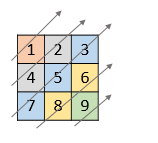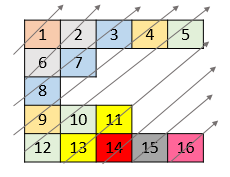Given a list of lists of integers, nums, return all elements of nums in diagonal order as shown in the below images.
Example
No.1
Input: nums = [[1,2,3],[4,5,6],[7,8,9]]
Output: [1,4,2,7,5,3,8,6,9]
No.2
Input: nums = [[1,2,3,4,5],[6,7],[8],[9,10,11],[12,13,14,15,16]]
Output: [1,6,2,8,7,3,9,4,12,10,5,13,11,14,15,16]
No.3
Input: nums = [[1,2,3],[4],[5,6,7],[8],[9,10,11]]
Output: [1,4,2,5,3,8,6,9,7,10,11]
No.4
Input: nums = [[1,2,3,4,5,6]]
Output: [1,2,3,4,5,6]
Constraints
- 1 <= nums.length <= 10^5
- 1 <= nums[i].length <= 10^5
- 1 <= nums[i][j] <= 10^9
- There at most 10^5 elements in nums.
Code
1 | public int[] findDiagonalOrder(List<List<Integer>> nums) { |

